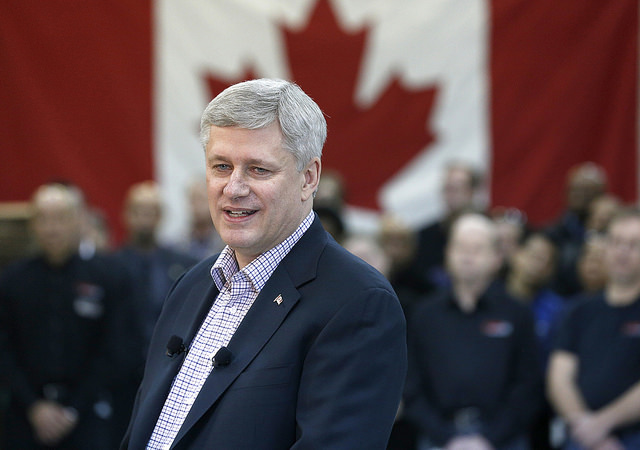Chip in to keep stories like these coming.
Short of a miracle, Canada is officially in recession, which I predicted back in January. But this recession was wholly avoidable had Mr. Harper and his government abandoned their wicked policies of austerity in favour of a growth-oriented fiscal expansionary policy. Bottom line: this is a Harper recession.
The economic follies followed by Prime Minister Harper in his nine years in office amount to a complete rejection of common sense. Except for maybe one year, Mr. Harper has voluntarily and aggressively followed an austerity policy that has been proven to be a complete failure. When we are officially not in recession, the economy is barely growing and our unemployment rate remains way too high.
Today, there is substantial agreement among economists that austerity policies do not work and cannot work. All political rhetoric aside, it is simply wrong to compare the role and responsibilities of a government to those of individuals. This is a foolish and dangerous line of reasoning. Yet Mr. Harper has made this argument the core of his philosophy with devastating results: it culminated in an “atrocious” first half of the year. Welcome to the economic consequences of Mr. Harper.
As we know all too well, austerity depresses economies — it creates neither wealth nor growth. It deprives the young generation of gainful employment, of experience, of independence and of self-worth. There is a tremendous lack of empirical and academic support for these policies. It raises the question: why is Mr. Harper insistent on following them? There is no economic justification for these policies: the only remaining one is pure ideology.
The mantra of Mr. Harper’s policies is his balanced budget. Yet his obsession about balancing the federal government budget is one of the main reasons we are in this mess now. Balancing the budget, especially at this time, is contrary to common sense. When the economy is tanking, the last thing we need is for the government to cut back on spending.
In Greece, we saw firsthand the problems of austerity, and while Canada and her provinces are no Greece, there is nonetheless a lesson to be learned from the Greek and European crisis: we cannot cut government expenditures and expect to grow: that is simply not how the mechanics of our economies operate.
You want to hear worse? Mr. Harper does not seem to have learned anything. In mid-July, he was saying that he would respond to the “downturn” with “strong fiscal discipline.” This is wrong for two reasons.
First, Mr. Harper blames the downturn on what is happening in the rest of the world. There is no doubt something there, but it is plain wrong to lay all the blame at the feet of international events.
Second, this recession (he is afraid of using the dreaded R-word) is almost entirely the result of his refusal to apply common sense economics to a depressed economy. Everything we know about economics indicates that we should be following the opposite approach: in “downturns” we react with more fiscal expansion, not less. And herein lies precisely the proof that this recession was avoidable: Mr. Harper’s wrong policies.
But it gets even worse. In July, Statistics Canada announced that our trade deficit grew, meaning we are importing more than we export, which will only contributes to slowing down the economy.
Economies can only grow from four possible sources: consumption, investment, government expenditures and exports. Consumers are too much in debt and wage growth is stagnant; private investment is flat (and in fact declining), net exports are falling, and Mr. Harper wants to continue to pursue his foolish policy of austerity. This shows a lack of understanding, a lack of empathy, and a lack of leadership. We are well into long-term stagnation with little possibility of sustained growth.
What is certainly bizarre is that Mr. Harper saw all the same warning signs as everyone else: the oil crisis has been threatening the Canadian economy for quite a while; the Bank of Canada has been warning us for quite a while. So Mr. Harper could have reacted had he chosen to, but decided against it.
Oh — don’t expect the economy to rebound much in the second half of 2015. Nothing is adding up.
Louis-Philippe Rochon is associate professor of economics at Laurentian University and founding co-editor of the Review of Keynesian Economics. Follow him on Twitter @Lprochon
Photo: pmwebphotos/flickr
Chip in to keep stories like these coming.



